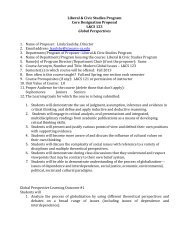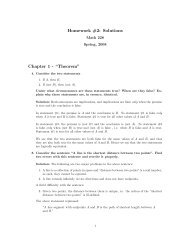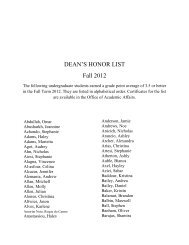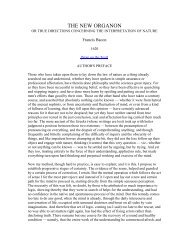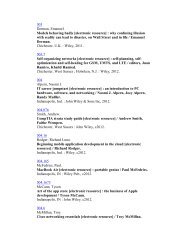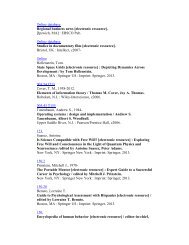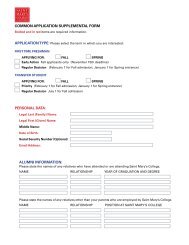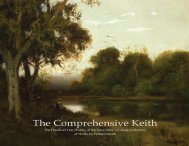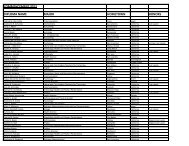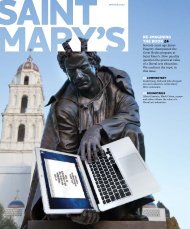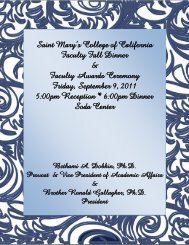2008-09 Catalog - Saint Mary's College of California
2008-09 Catalog - Saint Mary's College of California
2008-09 Catalog - Saint Mary's College of California
Create successful ePaper yourself
Turn your PDF publications into a flip-book with our unique Google optimized e-Paper software.
Anthropology CurriculumUpper DivisionAll upper-division courses have a prerequisite <strong>of</strong> any one <strong>of</strong> the followinglower-division anthropology or sociology courses. These courses includeAnthropology 1: Introduction to Social and Cultural Anthropology, andAnthropology 5: Introduction to Archaeology or consent <strong>of</strong> instructor.111 Kinship, Marriage, and FamilyFor more than one century anthropological research has focused onhouseholds, kinship relations and families across cultures and throughtime. This course provides students with a historical and theoretical perspectiveon the anthropological study <strong>of</strong> kinship, focusing also on variousissues that directly relate to the state <strong>of</strong> marriage and family throughoutthe world.112 Race and EthnicityAn examination <strong>of</strong> the major theoretical underpinnings <strong>of</strong> “race” and“ethnicity” as negotiated identities. Race as a culturally constructed modelis examined in a variety <strong>of</strong> international geopolitical regions, including theUnited States.113 Childhood and SocietyFocusing on children in Western and non-Western cultures and drawingon ethnographies from cultures around the world, the chronologicalsequence <strong>of</strong> childhood from birth to coming <strong>of</strong> age is followed. Topicsinclude changing notions <strong>of</strong> childhood, social and gender development,the marking <strong>of</strong> rites <strong>of</strong> passage, adolescence, education and the status<strong>of</strong> children.114 Urban Studies: The Culture <strong>of</strong> the CityBy 2030, two out <strong>of</strong> three people will live in an urban world, with most<strong>of</strong> the explosive growth occurring in developing countries. This coursein urban anthropology draws from ethnographic cases throughout thedeveloped and developing world. It examines the complex structural andcultural forces that shape the lives <strong>of</strong> those who dwell in cities by studyinghow urban culture is produced and reproduced under the influences<strong>of</strong> industrialization, colonialism, and globalization.117 Religion, Ritual, Magic, and HealingThe course examines religious beliefs, spirituality, and ritual in globalcultures. It takes a comparative approach to Western and non-Westernbeliefs in the supernatural and examines the importance <strong>of</strong> these beliefs.Topics include shamans and other religious specialists, social functions <strong>of</strong>ritual acts, faith healing, new religious movements, and the intersection <strong>of</strong>faith and socio-political forces in the contemporary era.118 Health and IllnessMedical anthropology explores the interaction between health, cultureand disease, emphasizing the importance <strong>of</strong> understanding issues <strong>of</strong>health and sickness cross-culturally. Medical anthropologists also lookat the roles <strong>of</strong> health care pr<strong>of</strong>essionals, patients, and medical settingsaddressing the relationships between health care systems and politicaland economic systems.119 Native American Cultures“Native American” is a label applied to all <strong>of</strong> the indigenous peoples <strong>of</strong>the Western hemisphere. This course gives students the opportunityto study a subset <strong>of</strong> Native American cultures in depth. Although thegeographic focus <strong>of</strong> the course rotates, it always includes a discussion <strong>of</strong>both the traditional lifeways and contemporary social issues <strong>of</strong> the focuscultures. May be repeated for credit as content varies.121 World CulturesEach World Culture course concentrates on the cultural, historical, political,religious and geographic factors that shape the lives <strong>of</strong> people livingtoday in a particular area or country, i.e., Central and South America,the Middle East, Asia and Sub-Saharan Africa, India, China, Polynesia,Western Europe, the Philippines, etc. May be repeated for credit ascontent varies.123 Ethnic Groups in the United StatesEach course in this series looks at a different American ethnic groups, i.e.African-American, Filipino-American, Hispanic, Scandinavian, etc. Whileaddressing the past, emphasis is placed on the contemporary period, witheach course focusing on the social, cultural and historical experiences <strong>of</strong>each group. Areas covered are assimilation and resistance, distribution inthe social and power structure, family systems and cultural values, laborand migration, role <strong>of</strong> religion, status <strong>of</strong> women, etc. May be repeated forcredit as content varies.125 Gender and CultureWhile sex differences are biological, gender encompasses the traitsthat culture assigns to and inculcates in males and females. This coursestudies the latter: the interplay between gender and culture. It takesan inclusive and cross-cultural perspective, with a focus on men andwomen, nonhuman primates, industrial and non-industrial societies anddiffering cultural contexts such as ethnic group membership and socioeconomicstatus.126 Field ExperienceGuided by an anthropology pr<strong>of</strong>essor <strong>of</strong> the student’s choice, this courseprovides students with the opportunity to gain hands-on experienceconducting anthropological or archaeological analysis in the field. Amongother sites, students can select supervised work in archaeological digs,community agencies, government bureaus, museums, and political orindustrial organizations.53



